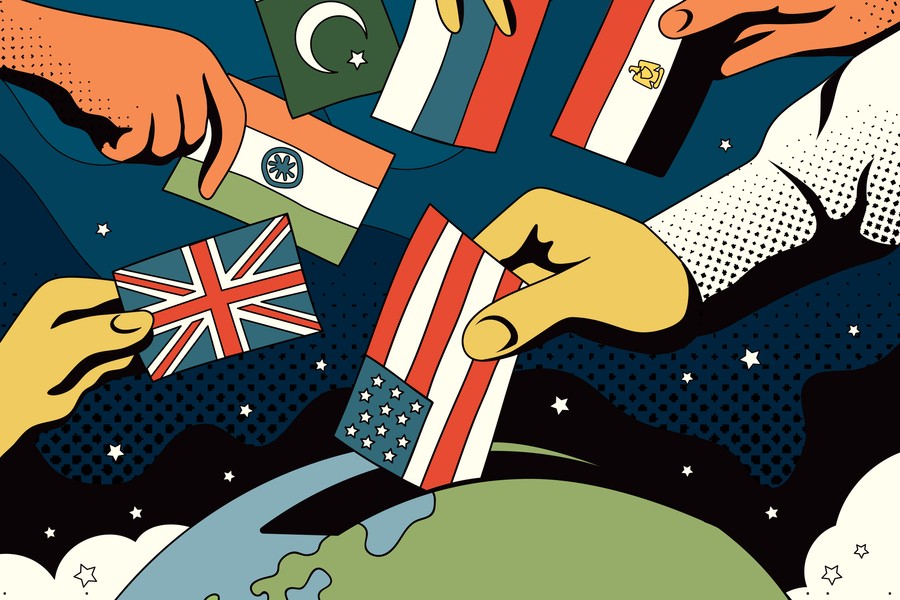The 54th gathering of the World Economic Forum in January this year occurred against its most complicated geopolitical backdrop to date surrounding Ukraine, the Middle East and China. This is coupled with a challenging economic picture driven by rising global debt and the shifting tectonic plates of inflation expectations and central bank interest policy.
The standout quote for me was from the celebrated primatologist Jane Goodhall: “Half the population of the planet is going to be voting. Every vote matters, more this year than perhaps any time in history.” Roughly 4 billion people will have the opportunity to vote in 2024, making it the biggest election year ever and what should be a triumphant one for democracy.
Some elections will have a disproportionate impact beyond their country’s borders, and this level of political uncertainty has the potential to create short-term volatility in global markets. Voting will take place in over 70 countries including India, Pakistan, Russia, Iran, South Africa, Egypt, the UK, America and many European countries. Mexico will likely elect its first female president: both leading contenders are women and less populist than the incumbent. By far the most important contest, America’s presidential election, has already cast a dark cloud over global politics. America’s future direction, and with it the world order American leadership has hitherto underwritten, will be on the line.
Most ballots cast will be in Asia. Bangladesh went to the polls in January, Sheikh Hasina securing a fourth authoritarian term and with it her title as the longest-serving female head of government. The election of the Democratic Progressive Party in Taiwan in January will have lasting ramifications across the Taiwan Strait and potentially increase US-China tensions and the risk of Chinese adventurism. The Indonesian election in February could further boost sentiment in Asia and some emerging markets. Under incumbent Prime Minster Narendra Modi (a close ally of Donald Trump), India is enjoying remarkable economic growth and geopolitical success, so the most populous global election in May looks a foregone conclusion. Modi’s emphasis on infrastructure and digitisation has resulted in India being a beneficiary of investor unease with China, with foreign direct investment allocating over US$20bn more to India than China.
Roughly 4 billion people will have the opportunity to vote in 2024, making it the biggest election year ever and what should be a triumphant one for democracy.
The UK election must be held by January 2025, the first election since 2010 without the turbulence of Europe and Scotland. A Labour win is likely, but few outside Britain should notice much change. The prospect of a government spearheaded by Sir Keir Starmer is unlikely to spark the sort of flight to safety which occurred when markets were faced with the prospect of a Corbyn-led Labour administration in 2019. The difference between Labour and the Tories is largely academic on trade, foreign and defence policy and relations with China and America, so the victor will be the party that can turn the heads of the centrist voters. The state of the economy has overtaken health as voters’ most important issue. Labour will inevitably focus on the cost-of-living crisis and we can expect the Tories to hammer away at voters’ lingering doubts about Labour’s fiscal integrity.
Limited cash remains in the Treasury coffers for either party to enact sweeping fiscal and supply side economic policy. Keir Starmer appears keen to avoid racking up spending commitments, having announced only a handful of marginal tax rises on private schools, oil and utility giants and rich foreigners to fund government policy. However, Keir Starmer knows all too well about complacent, soft and indecisive centre-left parties that throw away a winnable election before they acquire the ruthlessness to win, such as Labour losing in 1992.
Evidence suggests that the UK stock market is buoyed by change in government, rather than the incumbent winning. On average, the FTSE All-Share has recorded positive total returns in the post-election year which sees one government expelled and another party ushered into parliament. There are also greater overall average gains when a government changes following an election and the British Pound may in fact strengthen on economic policy change and renewed confidence in the economy.
Nothing, however, will compare to America’s election for potential consequences. Despite a presidency that has been defined by high inflation and geopolitical turmoil abroad, President Joe Biden faces minimal opposition to stand again, notwithstanding a health event. A Democrat win would see limited industry impact and a continuation of the current policies, with more focus on renewable and clean energy and more financial regulation.
On the Republican side, Donald Trump looks on track to secure his party’s nomination by 19th March. One could argue that Donald Trump’s very candidacy undermines American democracy. Trump promises to increase tariffs on imports by 10%, (there is talk of a 50% tariff on goods from China) and rein in excessive government spending on foreign aid, climate subsidies and immigration. His message to voters is that his isolationist stance will save taxpayers money by, among other things, freeing the country from involvement in expensive overseas conflicts such as the war in Ukraine.
A second Trump term would transform America into a loose cannon with isolationist tendencies at a time of geopolitical risk. The number of state-based conflicts, at over 50, is near its highest level since 1946, according to the Peace Research Institute in Oslo. America’s allies, especially those that are part of NATO, could expect an assessment of the extent to which they “freeload” off America, for example by running a trade imbalance with it or spending paltry amounts on their armed forces. This will ultimately drive higher domestic government spending for all Western countries, increasing budget expenditure on defence and the onshoring of energy and industrial supply chains.
Votes this year could mean changes to some of the most important economic, environmental and geopolitical issues impacting the world.
Taiwan runs a large trade surplus with America and it relies on an American military presence to deter a possible invasion by China. Trump’s likely failure to defend Taiwan would set a precedent for other Asian allies and frustrate regional defence plans. Trump may see the war in Ukraine as a drain on valuable American resources and try to push Ukraine into a peace deal with Russia. Betraying Ukraine would leave both Russia and its leader, Vladimir Putin, in strengthened positions and Trump’s boast to end the Russia-Ukraine conflict in 24 hours would be at Ukraine’s expense. Israel could expect further support and the dismissal of Palestinian aspirations for their own state.
Trump has reportedly said that America would not come to Europe’s aid if the continent came under attack, threatening NATO’s Article 5: that an armed attack on one member shall be considered an attack against them all. The consequences could be catastrophic for global stability, democracy and detrimental to the already fragile economies of Europe. Under his administration, unrestrained spending and tax cuts and his refusal to touch Social Security and Medicare would drive inflation expectations up and bond prices down. There would be uncertainty surrounding follow-through on the Inflation Reduction Act, a lack of support for electric vehicles and clean energy and an increase in permit grants for US oil and natural gas drilling.
Pressure on the US Federal Reserve to cut interest rates would resume if Trump is re-elected, with his intention to boost the domestic economy and weaken the dollar. Policymakers have signalled that rates may come down before the end of 2024, but policy will remain restrictive for some time. Some clients will recall the phrase coined by James Carville during the Clinton campaign of 1992: “It’s the economy, stupid.” This is perhaps the important point to note: the forward path for the economy and the outcome of the Federal Reserve’s effort to tame inflation through its rate hiking campaign is more consequential to investors than the eventual constellation of White House, Senate, and House of Representatives political control.
To conclude, votes this year could mean developments on, or changes to, some of the most important economic, environmental and geopolitical issues impacting the world. A new landscape of greater geopolitical risk will mean volatile inflation and bigger budget deficits. In the biggest election year ever, it would be foolish to ignore this risk within client portfolios. I would reiterate the importance of well-diversified multi-asset portfolios and to avoid concentration risk in any one asset class, sector or stock. I firmly believe that holdings in soundly financed companies with genuine pricing power still offer the best opportunity to protect portfolios from heightened geopolitical risk, inflation and the impact of higher rates globally.





